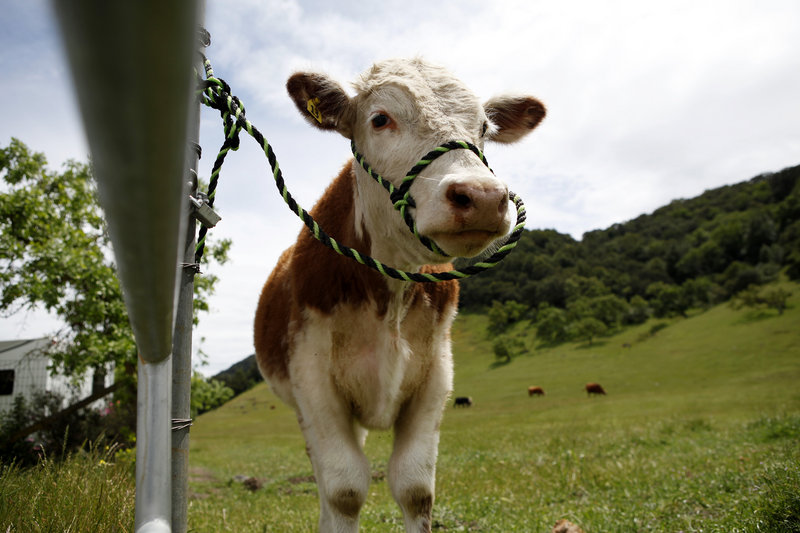SAN JOSE, Calif. – After decades of debate, federal regulators have condemned the practice of using antibiotics on healthy farm animals, trying to stem the rise in so-called “superbugs” that pose a dire threat to human health.
The new guidelines from the Food and Drug Administration, which are voluntary, advise the agricultural industry to use antibiotics “judiciously” in treating and preventing sickness, and recommend that veterinarians oversee usage. The new stance follows studies by scientists and the FDA from the 1970s, which showed that antibiotics given on farms lead to drug-resistant bacteria — the superbugs — that can spread to humans.
In the past several decades, health care professionals as well as veterinarians have seen a steep rise in drug-resistant infections. Just one of the types of resistant bacteria, Methicillin-resistant Staphylococcus aureus, or MRSA, which is found in both farms and hospitals, has been estimated to kill more people than AIDS, according to the federal Centers for Disease Control and Prevention. MRSA has also been found on packaged meat in grocery store shelves.
While many scientists and the American Veterinary Medical Association laud the FDA’s move, state ranchers and dairy farmers fear they’re headed down a trail of over-regulation that would stymie the health care of their animals. Meanwhile, public interest groups, including the Natural Resources Defense Council, say the guidelines are simply not strong enough.
The FDA is giving the industry three years to adopt the guidelines before it determines the next step, which could be to make the rules mandatory.
“Antibiotic resistance has increased tremendously over the last several decades,” said Dr. Stuart Levy, an expert on the issue. The situation is critical, he said, because the resistant bacteria travel with food products from the farm to home.
A 2010 report by the CDC found an alarming amount of superbugs in grocery stores. More than half of all ground turkey carried E. coli that was resistant to three or more drugs. E. coli causes gastrointestinal infections and sickens about 265,000 people each year, according to the CDC.
Similarly, half of all packaged pork chops were contaminated with multi-drug resistant salmonella, another cause of gastrointestinal illnesses that sickens 1.2 million people each year and results in almost 500 deaths.
In a separate study published earlier this year, Iowa researchers found that nearly 7 percent of packaged pork products carried MRSA — even meat labeled “antibiotic free.”
Most food experts do say that the new guidelines will have little, if any, impact on grocery prices, even if they’re made mandatory.
Farmers learned in the 1950s that if they gave healthy animals food with a dash of antibiotics — less than the dose used to treat an illness — the animals would grow bigger and need less food. And nearly all of the antibiotics were available over-the-counter.
However, that also created perfect conditions for generating superbugs, according to numerous studies.
In a 1976 study, a team of researchers, led by Levy, fed chickens low doses of the antibiotic tetracycline — a drug also used in humans for a wide variety of infections, including sexually transmitted diseases and acne. Within a week, the birds had tetracycline-resistant bacteria in their intestines. In less than six months, farm workers and neighbors had spikes in tetracycline-resistant bacteria in their fecal samples.
Despite the worrisome 1976 findings, the FDA didn’t change the rules for antibiotic use on farms.
“We think basically that the FDA has caved to the agricultural industry,” said Avinash Kar, a staff attorney for the Natural Resources Defense Council. The council was one of several public interest groups that sued the FDA last May to press for strict rules on antibiotic usage on farms. The FDA produced the new voluntary guidelines independently from the lawsuit.
Send questions/comments to the editors.



Success. Please wait for the page to reload. If the page does not reload within 5 seconds, please refresh the page.
Enter your email and password to access comments.
Hi, to comment on stories you must . This profile is in addition to your subscription and website login.
Already have a commenting profile? .
Invalid username/password.
Please check your email to confirm and complete your registration.
Only subscribers are eligible to post comments. Please subscribe or login first for digital access. Here’s why.
Use the form below to reset your password. When you've submitted your account email, we will send an email with a reset code.